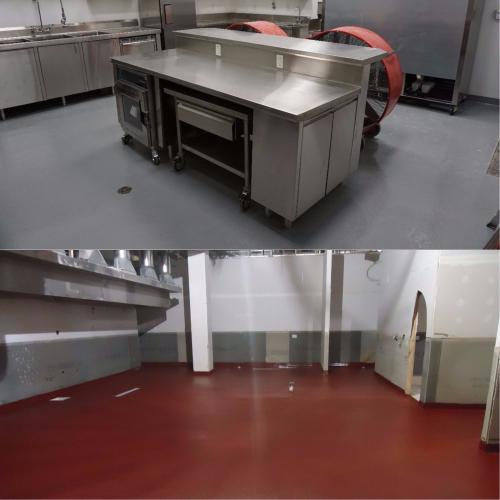Commercial Kitchen Flooring Overview
Benefits:
♦ Sanitary – Exceeds SQF Standards ♦ Extremely Durable ♦ Slip Resistant
♦ Low Maintenance- Easy To Clean ♦ High Impact Resistance ♦ Excellent Thermal Shock Tolerance
Commercial Kitchen Flooring:
Resinous Flooring vs. Quarry Tile
If your in need of new commercial kitchen flooring than you should seriously consider resinous flooring. Technically this flooring is not an epoxy but rather another type of resinous flooring known as urethane cement. Polyurethane resins, commonly referred to as urethane, provide cost efficient, long lasting, professional flooring results when properly installed. Urethane cement flooring installations provide strong protection to the substrate underneath from grease, oils, harsh chemical cleaners and disinfectants, high foot traffic, extreme temperature, thermal shock, abrasion, and environmental concerns such as mold, mildew and bacterial contamination.

In the past, the standard for commercial kitchen flooring has been quarry tile. There are a few problems with quarry tiles. First, they tend to crack and often pop up right off of the floor. Second, there are numerous grout lines that are difficult to keep clean. These grout lines can harbor mold, mildew, and harmful bacteria. (see our“Say No To Grout” page). Lastly, quarry tile can be slippery when wet. With the advent of urethane cement flooring, these issues are a thing of the past.
This new relatively new technology allows for a seamless flooring installation. No grout lines means no cracks or safe havens for contaminants to hide. Urethane cement also has a tenacious bond to concrete and other rigid substrates, it can even be installed over “green” concrete. Your new commercial kitchen flooring can even be customized with just the amount of slip resistance you desire. We generally try and find a “happy medium” between making the floor non-slip while still making it easy to clean.

Integral cove base is another feature worth mentioning. When we install your new commercial kitchen floor we can run the flooring right up the walls, typically about four inches. This is known as integral cove base or radius cove base. This type of cove base gets rid of 90 degree corners, again eliminating areas for dirt to catch as well as making the floor much easier to clean.

Comments